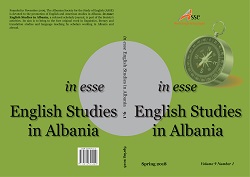Unadapted English loans in Romanian advertisements targeting women
Unadapted English loans in Romanian advertisements targeting women
Author(s): Bianca DabuSubject(s): Language and Literature Studies, Gender Studies, Communication studies, Language acquisition, Sociolinguistics, Theory of Communication, Marketing / Advertising
Published by: Albanian Society for the Study of English
Keywords: group communication; social status; glossy magazines; hedonic goods; utilitarian goods;
Summary/Abstract: The linguistic analysis of advertisements targeting women which contain unadapted English loans in Romanian focuses on the following directions: the relation between the social status of women as customers and the international products and the presence of English loans in the advertisements for such products.Nowadays, marketing cannot exist without the concept of culture. Schiffman, Hansen and Kanuk (2008, 368) defined culture as “the sum total of learned beliefs, values, and customs that serve to direct the consumer behaviour of members of a particular society”. Culture determines the identity of a human group in the same way as personality determines the identity of an individual. People with similar lifestyle are likely to affiliate to the same values that are used ”to differentiate and position brands vis-à-vis competitive brands” (Mooij 2010, 45). Age, gender, sexual orientation, regional, ethical, religious elements are used by marketers to segment consumers to influence their behaviour. What it means to be a man or a woman in our society is heavily influenced by cultural notions.“Gender role stereotyping as a communication strategy was often used by advertisers to establish a shared experience of identification with the consumers” (Hovland et al. 2005, qtd. in Chan and Cheng 2012, 83). Men and women process advertising messages differently. Since advertising both reflects and contributes to culture it is obvious that advertisements targeting women will envisage both the traditional and non-conformist stereotypes of women’s role in society. In the process of advertising and marketing, communication developing advertising messages involves a close understanding of different forms of linguistic typologies.The persuasion induced by English words or slogans, for example, makes the buyer create mental stereotypes connected to social status, appreciation or esteem needs. In Romania, glossy magazines display the largest number of advertisements using English loans (AUEL) as promoters of social status.
Journal: in esse: English Studies in Albania
- Issue Year: 9/2018
- Issue No: 1
- Page Range: 85-104
- Page Count: 20
- Language: English

